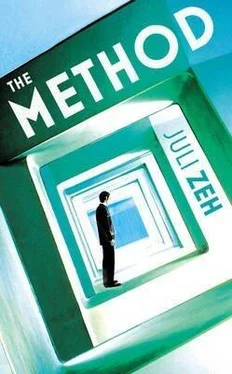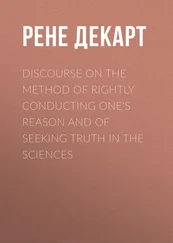Rosentreter clears his throat; he is visibly uncomfortable. ‘I’ve filed a suit at the High Court,’ he says, tugging at his hair. ‘Your proclamation hit home, but from now on we need to be really careful.’
‘Tell me about my triumphs.’
Rosentreter perks up and produces a pile of newspapers from his briefcase. He holds up the first one against the Plexiglas.
‘You made the front page: 10,00 °CROWD DEMANDS RELEASE OF MIA HOLL.’ He puts the newspaper away. ‘They’re standing out there with megaphones and placards. Nothing like this has happened for decades. I really wish you could hear them.’
‘I can hear them,’ says Mia.
‘Listen to this,’ he says, picking up another paper. ‘FRAU HOLL PUTS A HOLE IN THE SYSTEM. If only the hacks were more imaginative with their puns! Here’s another front-page story: METHOD UNDER ATTACK. It’s written by a Herr Wörmer. He wants the Method Council to re-evaluate the Method’s validity. And this one includes a letter signed by the PRI. The Alliance has come out in your support; its leadership is threatening to take action if the Method fails to admit responsibility for the death of Moritz Holl.’
‘The PRI? Tell them I’m not interested. Killing innocent people isn’t what I’m about.’
‘You may not have a choice. From now on there are two of you. The first Mia is sitting right here and … her lip is bleeding.’ He signals discreetly and she wipes her mouth. ‘The second Mia belongs to everyone who wants her on their side.’
‘Has Kramer made a statement?’
‘Not really. He’s supposed to be appearing on television tonight. He’s been damaged badly by all this.’
‘Good. He misjudged the situation.’
‘Which makes him all the more dangerous.’
‘Far from it. It makes him weak.’
‘Mia, please, I beg you not to talk to him.’
‘Who else is going to visit me?’
‘You always insist on doing things your way.’ Rosentreter puts away the newspapers and keeps his briefcase on his lap as if he needs something to hold on to. ‘I got you all wrong.’
‘Really? I thought you wanted a puppet to fight the battle for you while you wrung your hands in lawyerly despair. Well, that’s exactly what you’ve got.’
‘The flaws in my character are beyond question,’ says Rosentreter. He is doing his best to hold Mia’s gaze. ‘The trouble is, I didn’t expect things to move so quickly. I have no idea what will happen next.’
‘Let me explain. Every now and then, a unifying figure comes along and people realise they’re not alone with their doubts. The sceptical and the estranged, the lonely and the unhappy come together and discover the joys of community. I am the projection screen for their joy. A picture on a white wall. Full body shots. Naked, front and back. A statue of liberty, made of flesh and bone.’
As Mia straightens up and points an imaginary torch into the air, the guard in the corner lifts his chin threateningly, prompting the prisoner to sit down.
‘The pheromones of togetherness can turn the lonely into a powerful force,’ she says.
‘Don’t worry,’ says Rosentreter, who has been suffering lately from dry eyes. He blinks. ‘I’ll get you out of here in no time.’
‘I’m not worried,’ says Mia. ‘If you don’t get me out, the others will.’
‘EVEN AS A young man Heinrich Kramer was committed to serving humankind.’
The voice doesn’t sound like Wörmer’s, although the programme is What We All Think . We see a man on the sofa, staring straight ahead. Dressed in a grey suit, he looks perfectly calm and unruffled — an icon of self-possession, untroubled by salivary glands, sweat ducts or bowels.
‘In the wake of recent political developments we have invited him to present what is likely to be the fullest, most compelling elaboration to date of healthy thinking. Ladies and gentlemen, Heinrich Kramer!’
The man on the sofa doesn’t bother with introductory remarks. Instead he takes a few seconds, staring silently at the camera, as if looking for someone beyond the lens. The notes in his hand are purely for effect. He will speak from the autocue in his head. Heinrich Kramer has devoted his life to repeating the same ideas dressed up in different words. This isn’t a sign of limited imagination, but of the limited number of ideas that humans are able to draw on. There is no greater service that a man can perform for his country than repeating the right ones incessantly.
Kramer talks for twenty minutes, during which time he stares fixedly into the camera. He is making an important proclamation, as we can see from the earnestness of his expression. It would take a brave person to switch off the television and go outside. The streets are empty, like in the olden days when everyone stayed home to watch the World Cup Final. But since no one is prepared to miss Kramer’s proclamation, there is no one to witness the overwhelming absence of human beings in the streets. The whole country is hanging on Kramer’s words as he summarises his argument in support of the Method, each carefully worded proposition advancing with implacable logic towards the crowning point. His audience listens as he works his way through the usual line of reasoning: well-being is dependent on cleanliness and security, a lack of cleanliness is bad for the individual, inadequate security is bad for society, and faulty attitudes and faulty surveillance are responsible for disease.
The good bit comes last. Kramer talks about viruses that use uncleanliness and danger for their own ends, infecting individuals and society alike. He says the most dangerous viruses consist not of nucleic acids, but of infectious thoughts. At this point he stops. The silence continues for so long that his audience breaks into a sweat.
The Method, he says when he finally breaks the silence, is the country’s immune system. And the Method has identified the latest threat. The virus is being destroyed. No one can escape the ability of a healthy body to heal itself. Santé, and goodnight.
Already the sofa is empty and Kramer has left the studio. His exit conveys a message that everyone can read: words must be followed by deeds. The meaning of Kramer’s proclamation is clear to all. It marks the beginning of the end in the case of Mia Holl.
IT IS CRAMPED inside Mia’s cell, as if the absence of furniture has shrunk the four walls. There are no chairs at the missing table. A lack of bed occupies the space beneath the window, and there isn’t a wardrobe to hide the absent shelves. The whole room is replete with clinical cleanliness.
After only four days Mia is ready to welcome anyone into her cell. She needs help in occupying a space that even the furniture has abandoned. Kramer suits this purpose perfectly. A room that Kramer enters isn’t empty. He brings the suggestion of furniture with him, or maybe he is the furniture, elegant but functional. Mia struggles to hide her excitement when he walks through the door.
‘And your theories,’ she says by way of a greeting, ‘are as colourless and odourless as you are. They remind me of filtered water.’
‘I’m glad you liked the programme — I specifically asked them to let you watch.’
‘Something tells me your proclamation didn’t achieve the same impact as mine.’
‘Which is why I’m here — the two of us need to make some progress, take a step in the right direction.’
‘The two of us?’ Mia can’t help laughing.
‘Why not? You allowed me in here: you seem perfectly willing to talk. Besides, isn’t there something glorious about the clash of our manifestos? You and I, warriors on opposing sides, visors lowered and weapons in our hands. Reason versus emotion. The rigour of my logic against the maelstrom of your feelings. The masculine versus the feminine, if you like.’
Читать дальше












